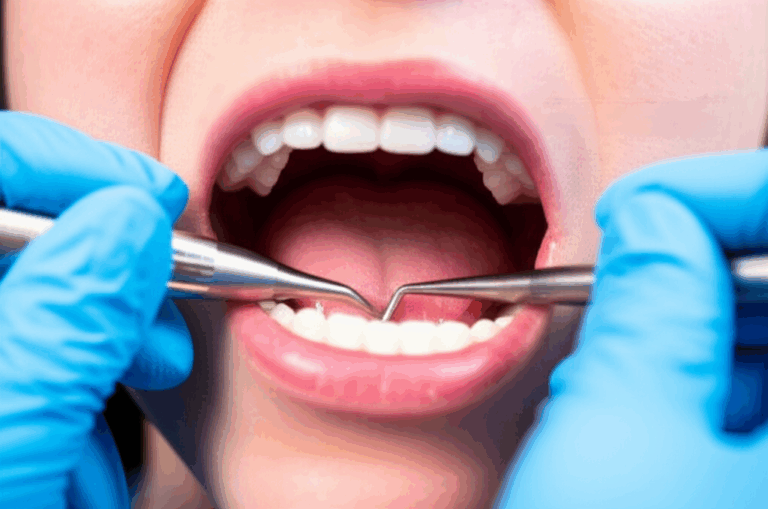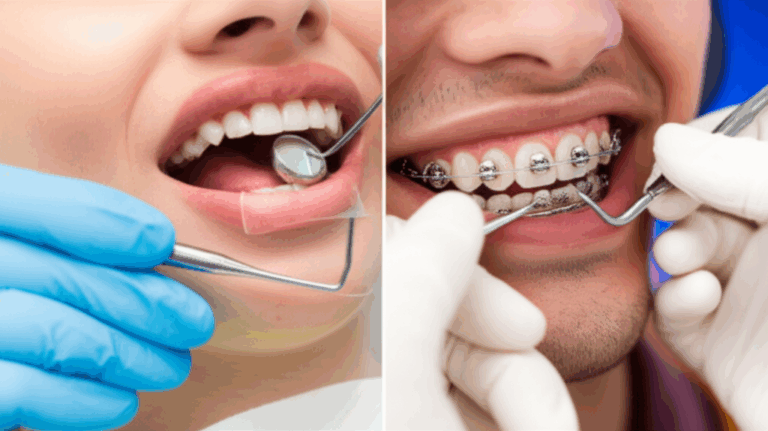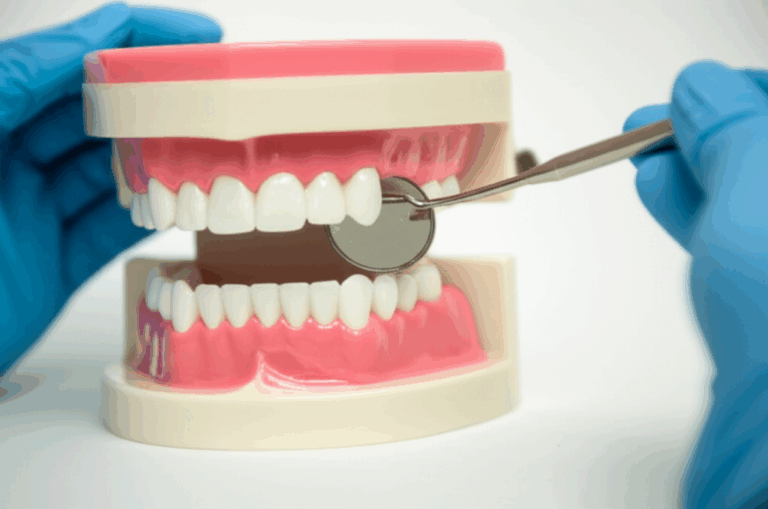
Canker Sores: Doctor or Dentist? Who to See for Mouth Ulcer Treatment
That sore, burning spot inside your mouth can make eating, talking, or even smiling hurt. If you’re looking at a canker sore (also called a mouth ulcer) and wondering, “Should I see my doctor or dentist about this?”—you’re not alone. Just about everyone gets a mouth ulcer at some point, and not knowing who to ask for help is super common.
In this guide, I’ll walk you through—in plain language!—who’s best to help you, when you can handle it at home, and when you should get help from a pro. You’ll get science-backed tips for pain relief and prevention, find out what causes canker sores, and feel sure about your next step to a pain-free smile.
What We’ll Cover
- What Are Canker Sores? (And Are Yours Normal?)
- When to See a Dentist for Canker Sores
- When to See a Doctor for Canker Sores
- When Should You See a Specialist?
- What to Expect at Your Appointment
- Self-Care and Home Remedies for Canker Sores
- Preventing Canker Sores: Key Strategies
- When to Seek Immediate Medical Attention
- Healthy Takeaway—What You Should Do Next
What Are Canker Sores? (And Are Yours Normal?)
Let’s start simple. Canker sores (aphthous ulcers) are small, shallow sores that show up inside your mouth. Usually, they look white or yellow in the center with a red edge. You might notice them inside your lips, cheeks, on your tongue, gums, or the soft part of your mouth.
Are they dangerous? Most of the time, they’re just annoying, not dangerous. They can hurt, sometimes a lot, but usually go away by themselves in one to two weeks.
Why Do They Happen?
Think of your mouth like a busy workplace. Even a tiny bump, scratch, or stress at the “work site” (your mouth lining) can cause a sore. The real reason for canker sores isn’t fully known, but things that often bring them on are:
- Accidentally biting your cheek or tongue
- Brushing too hard
- Eating sharp or spicy foods
- Wearing braces, loose dental pieces, or dentures
- Stress (yep, it can show up in your mouth too)
- Not enough vitamins and minerals (like B12, iron, or folate)
- Hormone changes
- Allergies to some foods or ingredients
- Health problems like Crohn’s disease, celiac disease, or immune issues
Most people get a canker sore once in a while. Some get them a lot, or get bigger, very painful sores that take longer to go away.
So, should you just put up with it, or is it time to get help? Let’s break it down.
When to See a Dentist for Canker Sores
Dentists look after your mouth—they check teeth, gums, jaws, and the soft tissues. For a simple canker sore, your dentist is usually the first person to help.
See Your Dentist If…
1. You have one or two small sores that:
- Came after biting your cheek, a cleaning at the dentist, or from rubbing of braces or retainers
- Are your first or only mouth sores, not a repeat problem
- Show up in the usual spots—the inside of lips, cheeks, tongue, gums, or roof of mouth
- Heal within one to two weeks
2. You notice a tooth with a sharp edge or a dental piece keeping you sore.
For example, a new crown, filling, or denture that’s rubbing a spot raw.
What Can Your Dentist Do?
- Check the sore: Dentists know the difference between canker sores, cold sores (which are usually on the outside of the mouth), and other mouth problems that might need a closer look.
- Offer treatment: Things like steroid creams, protective gels, and pain-numbing mouthwashes can help you heal quicker and hurt less.
- Remove what’s causing the problem: File down a rough tooth, fix or adjust dental appliances, or suggest softer dental care.
- Suggest home ideas: Dentists can tell you about over-the-counter (OTC) painkillers, saltwater rinses, and good ways to care for your mouth to heal faster.
- Keep track: They’ll check to be sure you’re healing, and that there’s nothing more serious going on.
If you’re already at the dentist for a cleaning, go ahead and ask, “Is this sore normal?” This is a regular part of what they do. Lots of dental clinics also work with labs that make things like crowns, bridges, and dentures, such as a china dental lab. Don’t be afraid to ask for help!
When to See a Doctor for Canker Sores
Doctors—especially regular family doctors—look at your whole body health. They’re the right choice if mouth ulcers could mean something more than just a local issue.
Book a Doctor Appointment If…
- You keep getting canker sores: More than 3–4 times a year, or lots of sores at one time.
- Your sores are big, strange, super painful, or slow to heal: If a sore is still there after 2–3 weeks or is making it hard to eat, talk, or swallow, see your doctor.
- You have other symptoms: Ulcers plus fever, skin rash, feeling very tired, joint pain, belly troubles, or swollen glands should be checked.
- Suspected lack of vitamins or health problems: If you don’t eat a lot of different foods, eat only plant-based diets, or already have health issues like Crohn’s, celiac disease, or immune-related problems.
What Can Your Doctor Do?
- Check more than your mouth: They’ll look for signs of health problems anywhere in your body.
- Order blood tests: To see if you have enough vitamin B12, iron, and folate; and to check for infection or immune problems.
- Give medicine by mouth if needed: Like steroid pills for really bad sores, or medicine for other health problems.
- Send you to a specialist: If something rare or serious is going on, your doctor can send you to an expert like an oral pathologist, stomach doctor, or immune specialist.
When canker sores keep coming back, don’t go it alone. Finding the cause now can help you feel better all over, not just in your mouth.
When Should You See a Specialist?
Sometimes, your dentist or doctor can’t figure out why you keep getting bad, weird, or non-healing sores. Then, you may need a specialist.
Types of Oral Health Specialists
- Oral Pathologist: Checks out any sore that won’t heal, keeps coming back, looks odd, or could be something like cancer. If they suggest a biopsy (taking a tiny bit of tissue for a test), it’s usually just to be sure.
- Oral Surgeon: Needed if mouth ulcers are so bad that surgery is needed (this isn’t common).
- Stomach or Immune Specialist: For mouth ulcers caused by problems like Crohn’s, celiac, or Behçet’s disease.
- Skin Specialist: If you have weird skin rashes or other issues along with mouth sores.
Don’t wait to see a specialist if you notice: Sores that won’t go away, your mouth changing fast, or ulcers that spread fast or bleed a lot.
What to Expect at Your Appointment
Wondering what will happen? Here’s what most doctors and dentists do:
1. Health History
They’ll ask things like:
- How often you get sores
- How long they last
- How much they hurt
- If certain foods or things seem to trigger them
- Whether you have other problems (fever, tiredness, belly problems, etc.)
- Any recent medicine changes or sickness
- Family with similar problems
2. Careful Look at Your Mouth
The doctor or dentist will shine a light in your mouth, maybe tap a bit to see if it’s sore, look at where, how big, and what the sore looks like. They might gently check your teeth, gums, and neck glands too.
3. Tests (If Needed)
Blood tests might be done to look for low iron, low B12, or immune problems. A biopsy is rare, but helps if something looks suspicious.
4. A Plan for Treatment
You’ll talk about what might be causing your sores, the best ways to help at home, and any medicine you might need. If you need to see a specialist, they’ll tell you what to expect.
Self-Care and Home Remedies for Canker Sores
Sometimes the best help starts at home! Here’s how you can make the pain go away faster, heal up, and avoid future sores.
Quick Ways to Feel Better
Painkillers: Ibuprofen or acetaminophen can help with pain. Follow label directions.
Numbing Gels: Benzocaine gels (like Orajel, Anbesol) or mouthwashes with lidocaine can numb the spot. Don’t swallow these.
Covering Pastes: Orabase or sucralfate can protect the sore from rubbing.
Mild Rinses: Rinse with saltwater or baking soda. Mix a teaspoon in a cup of water, swish and spit.
Prescription Mouthwash: If given by your doctor or dentist, these may have a mild steroid or other healing medicine.
Eat and Drink Softer Foods
- Pick soft, mild foods when you have a sore—scrambled eggs, mashed potatoes, yogurt, for example.
- Avoid sour (like citrus), spicy, or scratchy foods.
- Drink enough water. Stay away from soda, alcohol, and mouthwashes with alcohol.
Keep Your Mouth Clean the Gentle Way
- Use a soft toothbrush so you don’t scratch.
- Try an SLS-free toothpaste (sodium lauryl sulfate can bother some people’s mouths).
- Floss gently and don’t poke the sore.
Preventing Canker Sores: Key Strategies
Think of building a wall inside your mouth—good habits make it harder for sores to pop up!
- Avoid your triggers: If you find that some foods, like chocolate or nuts, or stress, bring on sores, write it down to find patterns.
- Brush and floss gently: Talk to your dentist if you need tips for caring for your mouth if it’s sensitive.
- Eat a healthy diet with enough vitamins: Go for leafy greens, good proteins, and whole grains. Ask about vitamin pills if you can’t eat enough from food.
- Deal with stress: Things like deep breathing, yoga, or gentle exercise can lower your risk.
- Fix dental device problems: If dentures, partials, or retainers leave sore spots, your dentist or a removable denture lab can help you.
- Drink water: Dry mouth can make sores easier to get.
With good habits, you’ll get fewer canker sores and heal faster when they do happen.
When to Seek Immediate Medical Attention
Most canker sores are not dangerous. But don’t ignore signs of a bigger problem:
- Sores with a high fever
- Trouble swallowing or breathing
- Sores with a big rash or spreading past the mouth
- Ulcers that bleed a lot or won’t stop
- Swelling of mouth, lips, or tongue (especially with breathing trouble—this could mean a serious allergy!)
- Sores that look very odd or grow fast
When you’re not sure, call your doctor or dentist to check it out.
Data at a Glance: Canker Sore Facts
| Category | Fact / Key Point |
|---|---|
| General Prevalence | Up to 25% of people get at least one sore a year* |
| Most Common Causes | Small injury, stress, low vitamins, spicy or sour foods |
| Typical Healing Time | 7–14 days for small sores, up to 3 weeks for big ones |
| When to Seek Care | >3–4 times/year, lasting >2–3 weeks, really painful, other symptoms |
| Topical Relief Success | Most mild sores heal with simple care at home or dentist |
| Associated Conditions | Crohn’s, celiac disease, Behçet’s, immune problems |
\*Source: Mayo Clinic, American Dental Association
Who Is “At Risk” for Canker Sores?
Canker sores can happen to anyone, but some people get them more:
- Teens and young adults—females a bit more often (might be hormones)
- Those with a family history of mouth sores
- People with long-term health conditions (like Crohn’s, celiac, Behçet’s, anemia)
- Vegans or vegetarians who don’t get enough B12 or iron
- People with braces or dental stuff in their mouth
- Folks under a lot of stress
If you fit these, talk to your dentist about how to lower your chances.
Your Healthy Takeaway—What You Should Do Next
Here are the basics:
Most small canker sores don’t need a doctor or dentist. Give them about two weeks—they’ll heal if you care for your mouth, manage pain, and skip things that make it worse.
See your dentist if:
- Your sore came from mouth irritation
- It’s alone but not healing fast
- You need help with pain or figuring out the cause
See your doctor if:
- You get sores a lot, they’re big, or take forever to heal
- Sores plus fever, tiredness, or stomach problems
- You think there’s a vitamin problem or health condition
See a specialist if:
- Sores won’t heal, even with treatment
- The sore doesn’t seem right (odd look, fast changes, lots of bleeding)
- There could be cancer or a complex health issue
For everyone:
- Brush and floss gently
- Figure out and avoid your personal triggers (stress, certain foods, dental problems)
- Eat well and ask about vitamins like B12, folic acid, or iron if you need
- Call your dentist or doctor if you’re unsure—a quick visit now may help you avoid bigger problems
Remember, seeing a trusted dentist or doctor gets you the right help for you—not just a quick fix for pain. Your comfort, confidence, and health matter most.
Want to Stay Mouth-Pain Free?
Don’t let canker sores take away your smile. Simple care, the right expert, and a bit of prevention go a long way. If you get another sore, you’ll know exactly what to do—and who to call.
If you have more questions about mouth care or need help with things like dentures or crowns, you can always ask about labs and services for custom dental solutions. Your mouth will thank you.
Medically checked using current best practices from the American Dental Association and Mayo Clinic. For long-lasting or worrying problems, always see a health professional right away. This guide is just for learning and isn’t a replacement for a real doctor visit.
Don’t forget: You’re not alone, and feeling better could be easier than you think. Follow these steps, trust your gut, and don’t be afraid to reach out for help. A comfortable, happy smile can be yours again!








